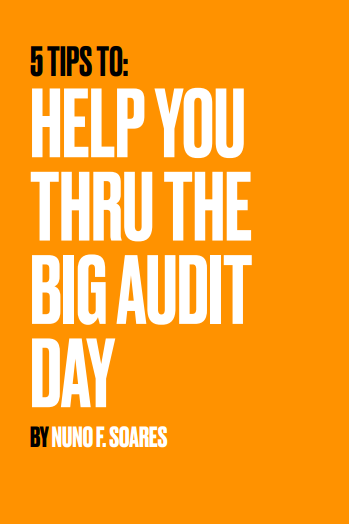By Mike Richman
Nuno F. Soares, Ph.D., is a long-time food safety professional, author, consultant, and trainer who knows about audits from both sides of the table.
His latest work is an e-book titled Five Tips to Help You Thru the Big Audit Day, which you can download here.
In this conversation, Nuno and I discuss his reason for writing the book and the meaning of these five tips.
MIKE RICHMAN: Why did you choose to write about this topic now?
NUNO F. SOARES: This is kind of a long story. I had a big change in my career last year when, after 20 years working in food safety, quality, and production, I decided I wanted to have a bigger and broader impact. Now I support food safety professionals in developing impactful and fulfilling careers.
This e-book is precisely a tool to do just that. In this particular work I suggest five mantras that food safety professionals can follow that will lead not only to a better performance during the audit but to a deeper understanding that audits are an opportunity for growth.
About the timing, well, any time is good to talk about audits, right? I suffered a lot of worry in my career, and I am sure that many food safety professionals also feel high levels of anxiety and stress in the days prior to audits. In recent weeks I came to the conclusion that I should no longer keep to myself what has helped me deal better with audits. And that’s why this e-book is now available.
MR: Tip No. 1 talks about understanding that the audit is about the system and the organization, and isn’t a personal assessment. How can the auditor help communicate this idea as well?
NFS: With empathy.
Sometimes even in our life we mix things up, right? People come up to us with a question and we don’t look at it objectively. Inside our brains we start asking questions like, “Why is she asking me that? Why to me? Why now? What’s behind this sudden interest?”
To avoid that, auditors must be very careful on how they ask questions, and especially to avoid any comments (or non-verbal language) that could be perceived as personal. Auditors should be clear and objective, always looking for conformity.
Of course this issue is aggravated sometimes by a lack of confidence and preparedness from the auditee. There is really nothing auditors can do in those cases besides use their best emotional intelligence skills.
MR: Closely tied with this is the idea of defensiveness, which you bring into your second tip. What are the signs of defensiveness that auditors should recognize?
NFS: Our old brain is always working to protect us from danger, which was incredibly useful when we needed to survive in the jungle. Our instinct when facing danger makes us run, fight, or freeze. During an audit, the auditor is asking questions and the auditee is replying. Naturally, this can be perceived as the auditor being an aggressor that disrupts our life to ask difficult questions. This can be an issue either if the auditee has high self-esteem or low self-esteem. In the first case it is possible that the auditee will enter into fight mode (disputing who knows more, or who is right or “righter”). In the latter (because running is not an option) most probably the auditee will freeze and tend to accept pretty much everything the auditor says.
Neither of these scenarios are good for the audit. The auditor should therefore avoid the first scenario by focusing on understanding where and how the auditee supports their decisions (moving away from justifications they come up at the moment). In the second scenario, the auditor can ask more questions to put the auditee at ease and bring to the surface what they have done to comply with requirements.
MR: In the third tip, you talk about an auditee’s reasoning and justification for specific actions. Shouldn’t an auditor approach an audit as a black-and-white analysis?
NFS: I think that depends a lot on the kind of audit you’re talking about. I believe that the black-and-white analysis increases as audits move from first party to third party audits.
Listening and understanding an auditee’s reasoning is especially important in cases of nonconformity. It is not a question of changing it to conformity, it is to understand what went wrong. Was the issue the reasoning, how the clause was implemented, or how people are performing the work?
I have to be honest. Every time I read people saying that auditors should help to improve the systems I feel discomfort. I am not sure that the role of the auditor is to help the system improve. I think that improvement is a natural consequence if the auditor helps to understand why and where things went wrong. Then it is an internal job to improve things.
MR: Learning and growth opportunities are covered in the fourth tip. Is that outcome something that auditors should be cognizant of?
NFS: I believe in my last answer you can find most of what I think about this from the auditor perspective.
I would only add one more thing: In this tip I explain that the auditees should look to audits as a learning experience and be cautious with their ego. But, at each audit, there is also learning and growth on the auditor side. Why not acknowledge it? If auditors put aside their egos also and share during the audit that they have learned something, this will only humanize them and improve the audit experience for everyone.
MR: And finally, in tip No. 5, you use a nice quote: “In the end, everything is going to be OK, and if it’s not OK, it’s not the end.” What does this mean to you in the context of audits?
NFS: You know, one of the advantages of having more than 20 years in the industry is that we have seen a lot. So many times I felt anxious and stressed before audits and in the end asked myself “I don’t know what I was so stressed out about.”
Listen, stress and anxiety are good (you didn’t see that coming, right?) They have a purpose. There is nothing wrong with it, it only means we are humans. The trick is how you deal with it. First you must acknowledge, “OK, I am feeling stressed/anxious.” Then you ask, “Why do I feel that way?” Probably just because YOU CARE. Then you must do the magic trick. If you care and you want everything to go right, first you do your job the very best you can. Then you tell your brain, “We have been here before, we know that in the end everything is going to be OK, and if it’s not OK, you just have to come in the next day and work harder and better.” This will help you transform stress and anxiety into excitement for having the opportunity of showing your work to another person and learning from the experience.
From what I have just explained it may seem I am looking at the issue only from the eyes of the auditee but is pretty much the same for auditors (specially on those first audits) or any other aspect of our life.
This is a great place to finish the interview as this circles back to the first question where I share the importance for me to not only support food safety professionals with the efficient and smart industry tools needed to grow faster, but also to guarantee they have a fulfilling career!
About the author
Mike Richman is the principal of Richman Business Media Consulting, a marketing and public relations company working with clients in the worlds of manufacturing, consumer products, politics, and education. Richman also hosts the web television program NorCal News Now, which focuses on social, economic, and political issues in California. He is a contributor to (and former publisher of) Quality Digest.

